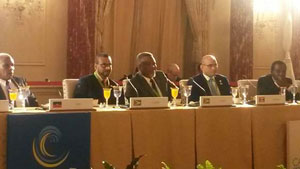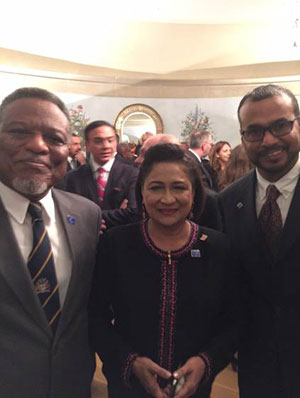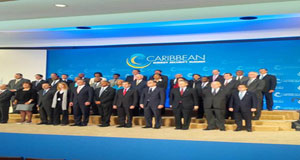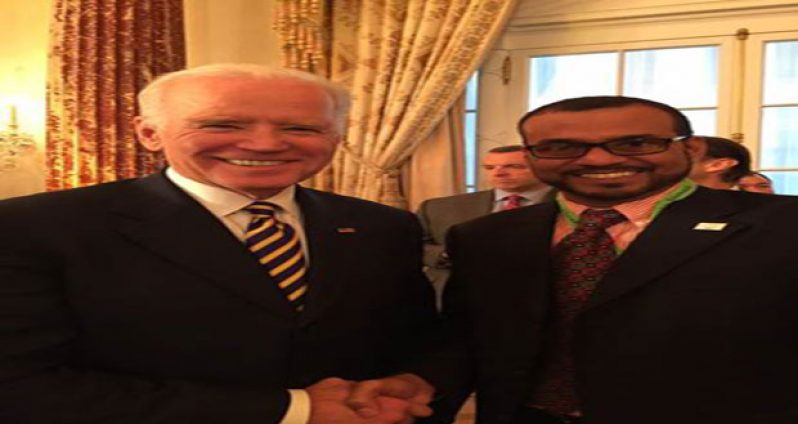PARTIES to the just-concluded inaugural energy security summit, among them the 15-member Caribbean Community (CARICOM), have agreed a menu of measures primarily intended to help transform the Caribbean’s energy sector.The pact was agreed Monday in Washington DC at the conclusion of the Summit, convened and hosted by U.S. Vice-President, Mr. Joe Biden as part of a proposed Caribbean Energy Security Initiative he had announced back in June 2014, while on a State visit to Trinidad and Tobago.


Guyana was represented at Monday’s meet by Prime Minister, Mr. Samuel Hinds, who has portfolio responsibility for Energy, and Minister of Natural Resources and the Environment, Mr. Robert Persaud.
Among Caribbean signatories to the landmark agreement were: The Governments of Antigua and Barbuda; Aruba; The Bahamas; Barbados; Belize; Curacao; Dominica; The Dominican Republic; Grenada; Guyana; Haiti; Jamaica; St. Kitts and Nevis; St. Lucia; St. Vincent and the Grenadines; Suriname; and Trinidad and Tobago.
Other parties to the pact included the Governments of the United Kingdom; The United States; Canada; Colombia; France; Germany; Mexico; New Zealand; and Spain, together with the Caribbean Community (CARICOM) Secretariat; the Caribbean Development Bank (CDB); the European Union (EU); the Inter-American Development Bank (IDB) Group; International Renewable Energy Agency; the Organization of American States (OAS); and the World Bank Group.
In a joint-communiqué issued Monday via the White House Office of the Press Secretary, the parties said: “We state our commitment to support the Caribbean’s transformation of the energy systems of Caribbean states; to share lessons learned through new and expanded regional information networks; and to report progress in relevant fora.”
Also included in the agreement is the implementation of a number of measures “in accordance with national laws,” among them the: “Comprehensive, planning-based and research-driven approaches to energy transition, including implementation of pilot and demonstration projects, based on successful models, so that individual clean-energy projects are part of a fully integrated, climate-resilient energy transition plan towards clean sustainable energy for all.”
According to the parties, where Caribbean countries are concerned, it is imperative that they pursue “… necessary and specific reforms, including recommendations from the 2013 CARICOM Energy Policy and the outcome of the 2015 Dominican Energy Pact, to support policy and regulatory environments that facilitate the introduction of new technologies favouring sustainable and clean energy that provides legal certainty for investors and improved predictability in price and supply for users.”
Other parameters are:
* “Where viable, alignment of national legal and regulatory approaches to facilitate greater clean energy investment throughout the Region, provided that countries can access finance and other resources on affordable terms, to set the stage for future electrical interconnection in keeping with the goals of Connect 2022.
* Where technically and commercially feasible, promote and develop affordable: (i) no- or lower carbon electricity generation through wind, solar, geothermal power, hydropower, bioenergy, ocean energy, energy recovery from waste, and other clean energies; and (ii) energy efficiency measures. Recognising also, that alternative fuels, such as natural gas, can play a useful bridging role.
* Open, transparent, competitive and criteria-based processes, including liberalisation where cost effective, to procure energy investment and facilitate access to finance for cleaner and climate resilient energy projects and infrastructure.
* Data and energy information exchange and coordination with, between, and among countries and stakeholders to minimise duplication and enable the monitoring and evaluation of energy projects to maximise the impacts of efforts towards fully integrated, low-carbon and climate-resilient energy transition plans.”



.jpg)








